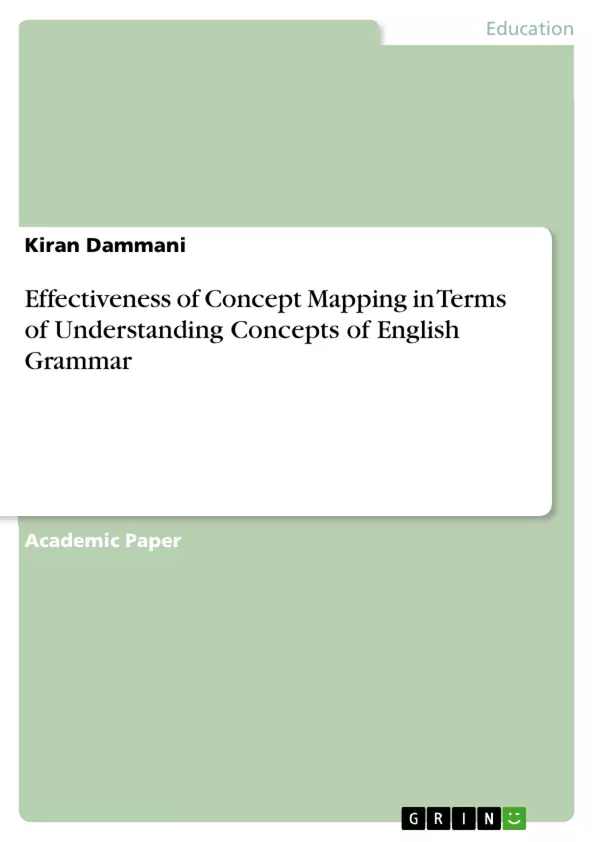In the present experimental study, an attempt was made to study the effectiveness of the Concept Mapping Strategy In terms of Understanding Concepts of English Grammar. Concept mapping is the strategy employed to develop a concept map. It is a graphical tool for organizing and representing knowledge. Concept Maps include concepts, usually enclosed in circles or boxes of some type, and relationships between concepts indicated by a connecting line linking two concepts. Words on the line referred to as linking words or linking phrases, specify the relationship between the two concepts.
The most important characteristic of a concept map is that the concepts are represented in a hierarchical fashion with the most inclusive, most general concepts at the top of the map and the more specific, less general concepts arranged hierarchically below. The concept map may pertain to some situation or event that one is trying to understand through the organization of knowledge in the form of a concept map, thus providing the context for the concept map. Another important characteristic of a concept map is the inclusion of cross-links. These are relationships or links between concepts in different segments or domains of the concept map.
For the present study, a Non-equivalent Control Group Design was employed. Sample of 81 students of class VIII studying in the academic year 2010-11 was selected, using a Random sampling technique for teaching selected concepts of English Grammar. The intact groups as existed in the schools were taken for experimentation. One of the groups was taught English grammar Concepts through the Concept Mapping Strategy the other group was taught the same concepts using the Lecture Method. The treatment continued for 17 days at a rate of 40 minutes per day. The data were analyzed using ANCOVA.
Table of Contents
- Abstract
- Introduction
- Concept Mapping
- Method
- Objective
- Sample
- Design
- Tools
- Procedure for Data Collection
- Results
- Implications
- References
Objectives and Key Themes
The main objective of this study is to evaluate the effectiveness of the Concept Mapping Strategy in improving students' understanding of English grammar concepts. The study compares the learning outcomes of students taught using this strategy with those taught through the traditional Lecture Method, controlling for pre-existing understanding of English grammar and intelligence levels.
- Effectiveness of Concept Mapping Strategy in enhancing understanding of English grammar concepts.
- Comparison of Concept Mapping Strategy with the Lecture Method in teaching English grammar.
- The role of pre-existing understanding of English grammar and intelligence on learning outcomes.
- Application of the Non-equivalent Control Group Design in an experimental study.
- Analysis of data using ANCOVA to determine significant differences between groups.
Chapter Summaries
- Abstract: This chapter provides an overview of the study's focus, methodology, and key findings. It highlights the use of Concept Mapping as a strategy for improving understanding of English grammar concepts and reports that the strategy was significantly more effective than the Lecture Method.
- Introduction: This chapter emphasizes the importance of meaningful learning and the limitations of traditional teaching practices. It highlights the potential of Concept Mapping as a strategy for promoting active and integrative learning, citing previous research that supports its effectiveness in various educational settings.
- Concept Mapping: This chapter provides a detailed explanation of Concept Mapping as a teaching technique. It describes the structure and components of a concept map, including concepts, linking words, hierarchical relationships, and cross-links. The chapter also includes an illustrative example of a Concept Map.
- Method: This chapter outlines the methodology employed in the experimental study, including the research question, sample selection, experimental design, tools used for data collection, and procedure for data analysis. The chapter details the specific characteristics of the participants, the non-equivalent control group design, and the treatment procedures used in the study.
Keywords
The key terms and focus areas of this research are: Concept Mapping, English Grammar, Understanding, Learning Strategy, Lecture Method, Non-equivalent Control Group Design, ANCOVA, Experimental Study, Educational Effectiveness, Pre-Understanding, Intelligence.
- Quote paper
- Dr. Kiran Dammani (Author), 2021, Effectiveness of Concept Mapping in Terms of Understanding Concepts of English Grammar, Munich, GRIN Verlag, https://www.hausarbeiten.de/document/983509


